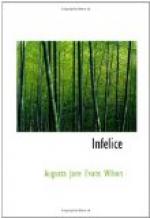“Not another word of conspiracy against my little maid’s peace! Lean forward a little, Peyton, and look at her yonder, coming along the rose-walk. See how the pigeons follow her. She has been gathering raspberries, and I promised she should make all she could pick into jelly for poor old Tobitha Meggs. How pure and fair she looks in her white dress! Dear little thing! Sometimes I am wicked enough to wish she had no mother, for then she would be wholly ours, and we could keep her always. Listen, she is singing Schubert’s ’Ave Maria’.”
After a moment’s silence Mrs. Lindsay rose, and, passing her arm around her son’s neck, leaned her cheek against his head, as he sat near his uncle, and looking through the open door at the slowly approaching figure.
“Bishop, if I were an artist, I would paint her as a priestess at Ephesus, chanting a hymn to Diana; and instead of Hero and the pigeons, place brown deer and spotted fawns on mossy banks in the background.”
“Pooh! What a hopeless pagan you are, Elise? If I were a sculptor I would chisel a statue of purity, and give it her countenance.”
And Mr. Lindsay smiled in his mother’s face, and said only for her ear:
“Do not her eyes entitle her to be called Glaukopis?”
CHAPTER IX.
The long sultry August day was drawing to a close, and those who had found the intense heat almost unendurable watched with delight the slow hands of the clock, whose lagging fingers finally pointed to five. The sky seemed brass, the atmosphere a blast from Tophet; and the sun, still standing at some distance above the horizon, glared mercilessly down over the panting parched: earth, as if a recent and unusually copious shower of “meteoric cosmical matter” had fallen into the solar furnace, and prompted it by increased incandescence to hotly deny the truth of Helmholtz’s assertion: “The inexorable laws of mechanics show that the store of heat in the sun must be finally exhausted.” Certainly to those who had fanned themselves through the tedious torture long remembered as the “hot Sunday,” the science-predicted period of returning glaciers and polar snows where palms and lemons now hold sway, seemed even more distant than the epoch suggested by the speculative. In proportion to the elevation of the mercurial vein which mounted to and poisoned itself at 100 degrees, the religious, the devotional, pulse sank lower, almost to zero; consequently, although circumstances of unusual interest attracted the congregation to the church, where Mr. Lindsay intended to preach his farewell sermon, only a limited number had braved the heat to shake hands with the young minister, who ere another sunrise would have started on his long journey to the pagan East.
At the parsonage it had been a sad day, sad despite the grave serenity of Mr. Hargrove, the quiet fortitude of Mr. Lindsay, and the desperate attempts of the mother to drive back tears, compose fluttering lips, and steady the tones of her usually cheerful voice. For several days previous, Mr. Hargrove had been quite indisposed, and as his nephew would leave home at eleven p.m., the customary Sunday night service had been omitted.




